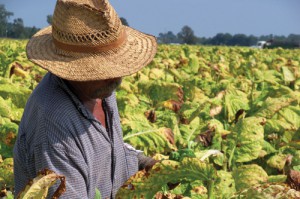A state of fear: Human rights abuses in North Carolina’s tobacco industry
Heat-related deaths in the field. Child labor. Wage theft. And decrepit housing. You might think that I was talking about conditions in a developing country, but actually this is the picture of our own agriculture system here in the United States. A report released last week by Oxfam America and the Farm Labor Organizing Committee […]
Heat-related deaths in the field. Child labor. Wage theft. And decrepit housing. You might think that I was talking about conditions in a developing country, but actually this is the picture of our own agriculture system here in the United States. A report released last week by Oxfam America and the Farm Labor Organizing Committee (FLOC) completed a human rights impact assessment of the North Carolina tobacco supply chain and documented many of these conditions.

At the launch of the report were some 60 migrant farm workers in Dudley, NC. You could smell the tamales roasting and the smoke from the barbeque while the President of FLOC told workers in Spanish to keep up the fight for justice. What really energized the crowd though, was a student from the United Students Against Sweatshops (USAS), Theresa Chang, who promised that USAS would unleash a campaign against Reynolds American Inc. on campuses across the country.
Oxfam and FLOC’s report, “A State of Fear: Human Rights Abuses in North Carolina’s Tobacco Industry,” found that changes in the tobacco industry in the last decade have made it impossible for many growers to survive on the income from their tobacco: Profits have shrunk, and growers can’t cover rising production costs. As a result it isn’t surprising that one in four farm workers in the study reported that they were paid less than the federal minimum wage of $7.25 per hour, and nearly all of the workers living in employer-provided housing described problems such as inadequate or nonfunctional showers and toilets, overcrowding, leaky roofs, lack of heat, and beds with worn out mattresses or none at all. As one farm worker said in his interview, “The contractor decides the pay rate and we have to either take it or not… If they are paying less there is not much more to do. We need work.”
As I drove three workers back to their labor camp after the launch event in Dudley, they began to tell me about the conditions of their housing. “There are so many bedbugs, they can’t get rid of them. They are everywhere,” said one worker. My colleague and I were shocked though when we pulled up to the housing. A ramshackle wooden structure that was located far off the main road with very few modern conveniences.
Unfortunately, the report confirms the deplorable conditions that we all hear about in the news. Just last month, federal officials fined three farms in Washington state $73,000 for the use of child labor in their strawberry fields. Since 2005 there have been 16 heat-related deaths of farmworkers in California alone, and this in the only state to have a legal requirement to provide shade and water breaks.
The assessment reached out to all stakeholders in North Carolina’s tobacco supply chain including manufacturers like Phillip Morris International (PMI) and Reynolds American Inc. The report also interviewed over 100 farmworkers. All stakeholders in North Carolina’s supply chain, including tobacco manufacturers like Phillip Morris International (PMI) and Reynolds American Inc., were invited to participate. Even though most of the manufacturers chose not to participate in the study, PMI did. Vice President of Regulatory Policy, Till Olbrich, acknowledged that a critical piece was missing in evaluating their supply when he said: “Because our contracts are with the farmers or in many cases even just the supplier who then, in turn, has to contract with the farmers, traditionally we have not had the practice of systematically reaching out to the labor on the farm. That has to change.”
More investments are needed in agricultural supply chains; growers are losing ground. They need to be involved in pricing formulas for their crops and be given multi-year contracts. Manufacturers need to create mechanisms that ensure that legal compliance occurs throughout their supply chain. They need to recognize farmworkers as full stakeholders and be included in audits and assessments. Farm workers should be guaranteed a voice in the system by guaranteeing the right to feely associate and the right to collectively bargain with their employers. When writer and restaurant critic Ruth Reichl in an interview with Chronicle HQ was asked what would be the next big food issue, she pointed to the conditions of farmworkers:
I feel like the next issue is going to be social justice for workers. Right now, all of the – well not all, but a lot – of the issues about pesticides and genetic modification are me-me-me. “I don’t want to eat this because it’s bad for me, or bad for my children.”
But the real issue isn’t us-us-us. The real issue is those people out there in the fields, surrounded by pesticides for their entire lives. The real issue is the people who are cutting meat in freezing cold temperatures, not making a livable wage and being cheated out of money. The real issue is the fact that agriculture in this country can’t operate without illegal labor.
I agree.